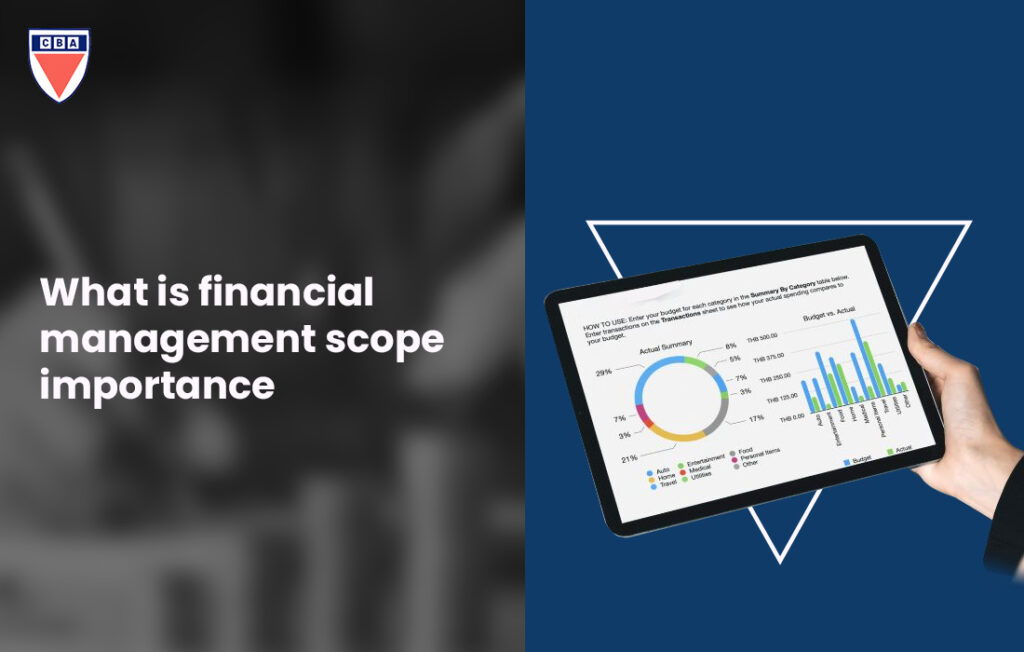What is Financial Management? Why It Matters, Its Full Scope, and the Types You Should Know
Financial management isn’t only about tracking numbers. It’s the lifeblood of every successful business and an essential component of personal financial wellness.
Whether you’re an entrepreneur looking to make your first major business investment or an individual trying to build personal wealth, accessing financial management means your money is working as hard as you are.
If done correctly, financial management provides clarity, control, and confidence to pursue larger goals without fear of unpleasant surprises.
Let’s see why financial management is important, the 7 critical areas, and the different types of financial management you should know about – in a practical, actionable form.
Why Financial Management is Non-Negotiable
Financial management is essential for more than just the sake of having a budget.
It’s what keeps companies afloat in economic storms, helps individuals achieve their life goals, and allows organizations to plan not just for today but for years ahead.
It is the responsibility that allows companies to remain above water in the event of economic turmoil, it is the responsibility that allows individuals to continue living their lives without being consumed in debt, and it is the responsibility that enables organizations to plan not just for the next fiscal quarter but for the next fiscal year or few decades.
More than anything, the significance of financial management is to do everything possible to prevent a crisis from arising, or at the very least, to minimize the consequences. There have been businesses, and fortunately, not many individuals, that have been faced with the sudden realization that their entire livelihood was gone in an instant. It was not because there were no opportunities or dreams; the problem was that no prior intervention was taken to manage the money properly. Effective financial management gives you the chance to look down the road for problems and prevent them or take action before they impact your financial situation, rather than realizing the mistake well after it has consumed your resources.
Besides, financial management offers you the greatest opportunity to return to making smart decisions. Knowing where you stand in cash position and your assets (and liabilities) worth allows you to say “yes” or “no” or whatever other decision with full command of your situation, rather than using your gut or, worse, a guess. You aren’t guessing; you are now making choices.
Another important factor is the ability to mitigate risk. There are always risks associated with any growth journey – for example, economic downturns, delays in supply chains, and competitive threats. However, a strong financial plan is the best form of shock absorption to take on the rough patches without compromising your growth.
Lastly, a strong financial discipline earns huge trust. Investors, banks, partners, and even customers all want to be affiliated with financially sound businesses and people. Clean and well-managed financials say professionalism, accountability, and staying power.
The Expansive Scope of Financial Management (The 7 Pillars)
Financial management isn’t just a single action–it is an extensive system with multiple connected areas. Each area is like a gear in a bigger machine, and when the gears all run smoothly, your financial future moves effortlessly.
Here is a deeper dive into the 7 scope areas of financial management:
1. Investment Decisions
One of the main responsibilities of financial management is deciding on how best to allocate funds to get the greatest possible return from funds.
In terms of investing, it is not simply about investing in stocks or properties. In businesses, it will often involve making decisions on whether to expand, buy new equipment, invest in research and development (R&D), or perhaps acquire another company.
Every investment decision involves a degree of risk, so financial managers will weigh the expected returns against any risks associated. Good investment practices do not just look at obtaining the highest return; they look to create long-term value. It’s about creating long-term value through strategic investment, not just opportunistic investment.
Think of it like planting seeds. You try and choose the healthiest seeds (investments), you try and plant them in the best soil (markets), and you try and nurture them as best you can for maximum harvest (returns).
2. Financing Decisions
Getting money for these investments is certainly important, but it’s just as important to determine how that money will be raised. Financial management involves considering the various ways to obtain financing, including loans, issuing equity shares, retained earning, or grants from the government.
The goal is to obtain the lowest cost, least risky mix of use of financing that does not compromise control or future flexibility for the organization. Too much leverage will create cash flow choking overhead from interest expenses, while too little equity to raise could mean the allocation of capital to others by diluting ownership. Financing is a question of balance – a balance of funding access along with long-term financial viability.
3. Dividend Decisions
Profit is fantastic, but what happens to the profits is both an art and a science. The organization, to a large extent, must decide what to do with its profit. How much will it distribute to shareholders in dividends, and how much will it retain for future reinvestment? An excessive distribution would likely starve a company of the capital it needs to grow, while an insufficient distribution is likely to upset shareholders and return on investment expectations.
Financial management plays its role by treating the distribution and retention in a way that keeps investors happy with the right amount of growth to justify the share and retained earnings. In personal finance, this would be both an enjoyable task and a tough decision on how much is enough to spend.
4. Working Capital Management
Working capital – the cash required to run day-to-day operations – can make or break a business.
Managing cash flows, paying suppliers, collecting receivables, and having an optimum level of stock without over-investing the cash in it – these are the financial management tasks we do every day in our businesses.
The smartest ones have tight controls on working capital. They collect amounts owing immediately (making the buyer pay for the privilege of delayed payment), pay amounts owing when it is beneficial to them, and hold a minimal inventory for a degree of efficiency, rather than holding excessive amounts for a cushion.
When working capital is managed well, it allows the business to weather the short-term fluctuations of the business cycle without going heavily into debt or finding it necessary to scramble for cash.
5. Financial Planning and Forecasting
You can’t travel towards a destination without a map. Just as financial management provides a roadmap, financial planning does too.
Financial management includes preparing budgets down to the dollar, forecasting revenues and expenses, forecasting cash flows, and setting the financial goals for the business.
It is not just about examining historical numbers; it is about anticipating future scenarios, best case, worst case, and every outcome in between.
Good financial planning allows you to respond proactively, not just reactively, when the market changes or an unforeseen expense comes about.
Financial forecasts are like a radar, identifying storms early enough in time to change course if necessary.
6. Risk Management
No financial plan is complete without a robust risk management component.
Markets rise, markets fall, consumer tastes change, and black-swan events (global pandemics, for example) can change the landscape in an instant.
Financial management addresses risks of all types — market risk, credit risk, operational risk — and puts together contingencies. These contingencies can take the form of insurance products, diversified portfolios, or reserves.
You can be sure that great financial management doesn’t simply ask, “What could go wrong?” It also asks, “When it does, how prepared are we?”
7. Reporting and Compliance
Numbers not only serve your purposes internally, they also have obligations to be shared externally with your regulators, investors, banks and auditors. Holding to deadlines and publishing accurate, transparent financial reports can foster a relationship of trust and compliance with rules and regulations.
Whether you are generating balance sheets, profit & loss statements, or dealing with the filing of taxes; compliance is not optional.
Poor financial reporting can cost reputations and result in unwanted legal issues, while clean reporting can lead to various opportunities.
This part of financial management isn’t glamorous, but it’s the foundation of credibility.
Types of Financial Management
Organizations have various layers in the same way that financial management has different varieties, with each variety serving a separate function/purpose:
- Corporate Financial Management concerns itself with an organization-level of finance management as a whole, focusing on raising capital, managing investments, and paying dividends.
- Personal Financial Management is comprised of things such as budgeting, saving, investing, and planning for your life goals.
- Public Financial Management pertains to how government institutions manage taxpayer funds, budgets, and investments to achieve a purpose other than profit.
- Nonprofit Financial Management focuses on maximizing limited resources for mission-related outcomes rather than profits.
All of these forms of financial management are based on the same principles, but each variety uses those principles to achieve its distinct objectives and serve its unique audience.
Wrapping It Up
Financial management is not just about surviving, it’s about thriving on your terms and intentionally. It empowers you to control your destiny, however that may look to you. For some, it’s about their life’s work and building a thriving business; for others, it’s about achieving their financial competence; for a few, it may be about social entrepreneurship and making a bigger difference in the world.
Even if you understand the concept of financial management, recognize its importance, and apply the right forms of financial management, it will not be “once and done”. Financial management is a fluid and holistic skill.
Financial management may apply whether you are running a startup, your business, your family finances, or even the financial direction of a national non-profit.
But a critical thought for consideration: yes, financial management and wisdom truly apply to making a profit, but it is what makes that all possible. Remember: Financial wisdom is not just about service, it is about service.
Are You Ready To Take Charge of Your Financial Destiny? Let’s get moving! Contact us today at Credit Bridge Advisor!






